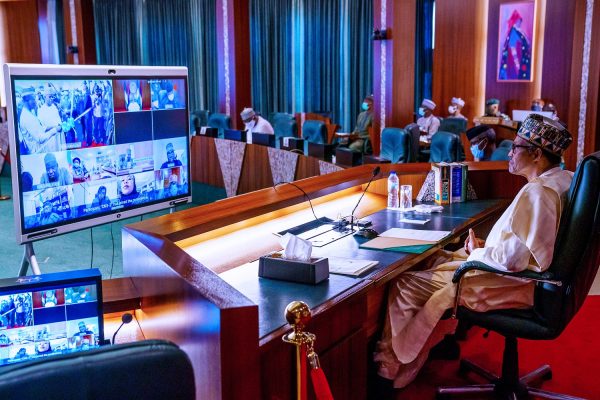Business
Ajaokuta-Kano Gas Project: Buhari charges private sector to lead development

BY KAZIE UKO
President Muhammadu Buhari has challenged the private sector to maximise the benefit provided by the country’s abundant gas resources for the overall development of the nation’s economy.
The president gave the charge on Tuesday in his speech at the flag off of the construction of the multi-billion Naira Ajaokuta-Kaduna-Kano (AKK) Gas Pipeline Project, in Kogi.
The project was commissioned physically by the Kogi State Governor, Yahaya Bello, on behalf of the president who participated virtually from the State House, Abuja.
“We promised the nation that we will expand the critical gas infrastructure in the country to promote the use of gas in the domestic market. These include the Escravos to Lagos Pipeline System – 2 (ELPS-2), Obiafu to Obrikom (OB3) pipeline and AKK.
“These projects are fundamental to our desire to industrialize and energise the entrepreneurial spirit that is ever present in our population. Hence, I had directed NNPC to ensure that these milestone projects are completed on time, within budgetary allocation and as per specifications.
“When completed, the AKK Gas Pipeline Project will provide gas for generation of power and for gas-based industries which would facilitate the development of new industries and also the revival of moribund industries along transit towns in Kogi State, Abuja (FCT), Niger State, Kaduna State and Kano State.
“When operational, the cascading effect and impact of the project will be immeasurable. It has significant job creation potential both direct and indirect, while fostering the development and utilisation of local skills and manpower, technology transfer and promotion of local manufacturing,” Buhari explained.
According to him, the project is part of the delivery of his government’s “Next Level Agenda” for sustainable development and enhancement of the economic prosperity of our country.
He said: “One of the lessons learnt from the novel coronavirus (COVID-19) Pandemic further underscores the drive of this administration for export substitution initiatives and projects that will promote local manufacturing.
READ: Nigeria earns N66bn from Stamp Duties in 5 months
“We must also learn lessons from other countries who have methodically made the transition from oil rich countries and used their crude as a pathway to economic and industrial diversification.
“In particular, Gulf countries who have similar levels of gas reserves as Nigeria, have a strategy centred around gas-industrialisation as their foundation towards export diversification. This has to be our guiding principle as we seek to attract investment and create opportunities for our people.
“In this regard, I challenge our private sector to lead the charge in maximising our gas resources to create a petrochemical hub that will resurrect not only our manufacturing capacity but place us squarely on the path to increased self-sufficiency.
“As the world evolves, we owe our people the responsibility to prepare them for what the future holds. We therefore must be bold and fearless and can no longer be incremental in our approach.
“Time is short, and our people’s zeal is strong and palpable. Infrastructure development although long, tedious and complex remains a cardinal objective of our Administration’s drive towards ensuring a stable, sustainable and more prosperous future for our citizenry.
“Today marks an important chapter in the history of our great Nation. It marks the day when our domestic natural gas pipeline networks; from Obiafu in Rivers State, Escravos in Delta State and Lekki in Lagos State, are being connected through Kaduna to Kano States thereby enhancing national energy security, creating balanced development, and further integrating our nation.”
